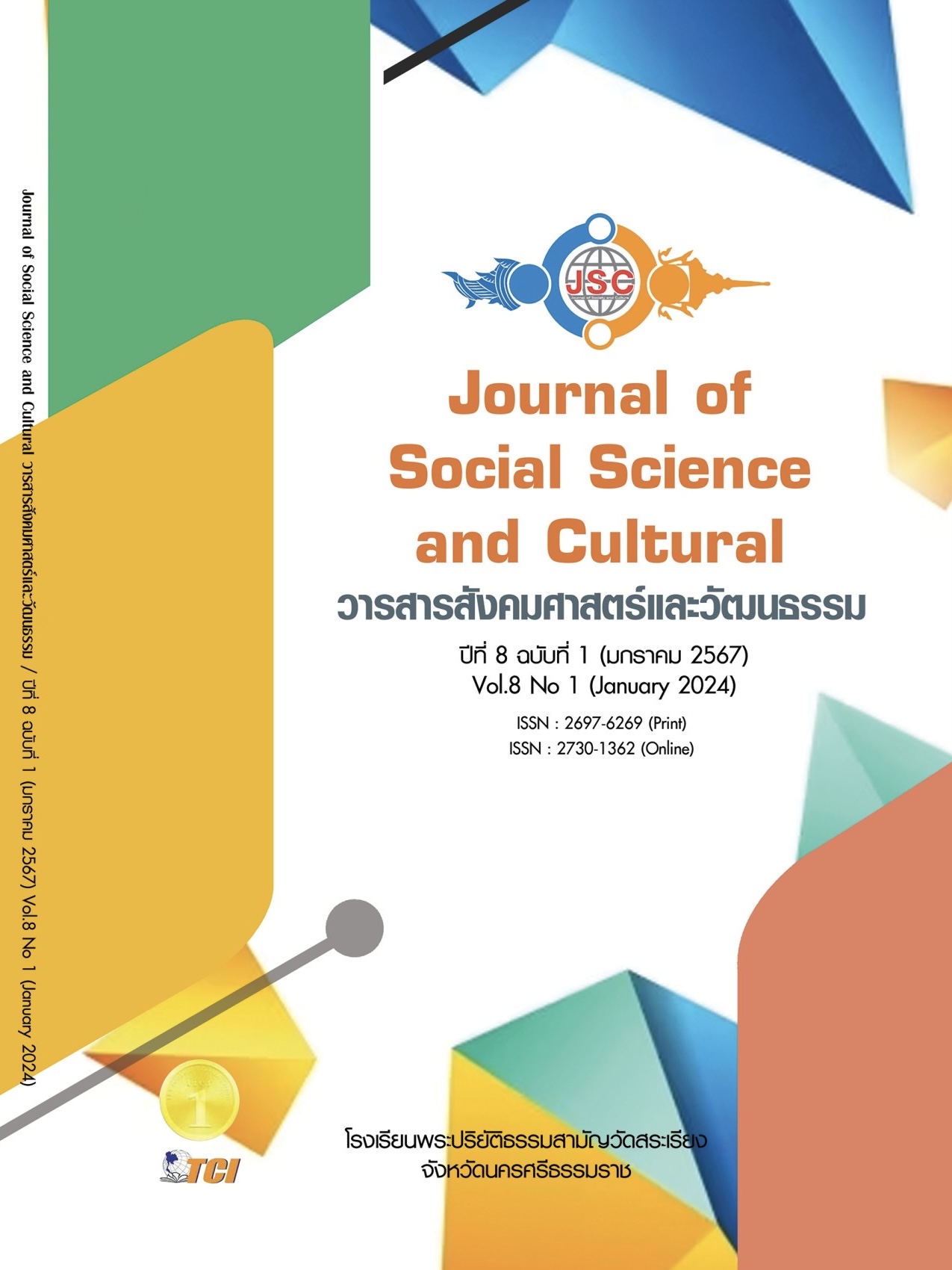ANALYSIS OF FACTORS INFLUENCING TO ALGEBRAIC LEARNING ACHIEVEMENT BY STRUCTURAL EQUATION MODELING
Main Article Content
Abstract
The objective of this research was to develop and examine the consistency of the structural equation model of factors influencing the algebraic learning achievement of grade 10 students and study the factors influencing the algebraic learning achievement of grade 10 students. It is correlational research that collects data from the results of responses of sample group consisted of 377 grade 10 students of demonstration schools in the academic year 2022, which was obtained through multi-stage random sampling. The instruments used in this research consisted of the measurement of factors influencing on algebraic learning achievement and the algebraic learning achievement test developed by the researchers. Data were analyzed by structural equation modeling: SEM. The research results found that 1) The developed structural equation model of factors influencing algebraic learning achievement was consistent with the empirical data. 2) The achievement motivation and mathematical representation had a direct influence on algebraic learning achievement with statistical significance at the .05 level. As for the dedication to learning, the students’ faith in the teacher, and the categorization skill, there were no statistically significant direct influences on algebraic learning achievement. However, the dedication to learning had an indirect influence on algebraic learning achievement with statistical significance at the .01 level through achievement motivation and mathematical representation. In addition, the achievement motivation had an indirect influence on algebraic learning achievement with statistical significance at the .01 level through mathematical representation. The categorization skill had an indirect influence on algebraic learning achievement with statistical significance at the .01 level through mathematical representation.
Article Details
References
สถาบันทดสอบทางการศึกษาแห่งชาติ (องค์การมหาชน). (2559). สรุปผลการทดสอบทางการศึกษาระดับชาติขั้นพื้นฐาน (O-NET) ชั้นมัธยมศึกษาปีที่ 6 ปีการศึกษา 2558. เรียกใช้เมื่อ 18 พฤศจิกายน 2023 จาก http://www. 18 พฤศจิกายน 2023onetresult.niets.or.th/AnnouncementWeb/PDF/Summary ONET M6_2558.pdf
สถาบันทดสอบทางการศึกษาแห่งชาติ (องค์การมหาชน). (2560). สรุปผลการทดสอบทางการศึกษาระดับชาติขั้นพื้นฐาน (O-NET) ชั้นมัธยมศึกษาปีที่ 6 ปีการศึกษา 2559. เรียกใช้เมื่อ 18 พฤศจิกายน 2023 จาก http://www.newonetresult.niets.or.th/AnnouncementWeb/PDF/SummaryONETM6_ 2559.pdf
สัมพันธ์ พันธุ์พฤกษ์. (2558). คะแนนโอเน็ต ม.6 ต่ำเหมือนเดิม. เดลินิวส์. เรียกใช้เมื่อ 18 พฤศจิกายน 2023 จาก http://www.dailynews.co.th/education/308764
Abuameerh, O. A. & Saudi, M. A. (2012). The Relationship between Achievement Motivation and Academic Achievement for Secondary School Students at Salt in Jordan.Dirasat, Educational Sciences, 39(1), 313-320.
Allen, J. (2015). Influence of Achievement in Core High School Courses on ACT Scores. Retrieved February 1, 2015, from https://www.act.org/content/dam/act/unsecured/documents/2015-Tech-Brief-Influence-of-Achievement.pdf.
Awan, R. U. N. et al. (2011). A Study of Relationship between Achievement Motivation, SelfConceptand Achievement in English and Mathematics at Secondary Level. International Education Studies, 4(3), 72-79.
Babatunde, M. M. & Olanrewaju, M. K. (2014). Predictive Influence of Students’ Academic Engagement and Academic Self-Concept on Achievement Motivation among Post Graduate Students in University of Ibadan, Oyo State, Nigeria. International Journal of Science and Research (IJSR), 3(5), 497-502.
Bailey, M. et al. (2014). A Multivariate Model of Achievement in Geometry. The Journal of Educational Research, 107, 440-461.
Bankole, R. A. (2010). Student Trust in Teachers and Its Relationship to Student Identification with School, Student Perceptions of Academic Press, and Achievement. In Degree of Doctor of Philosophy in Education. The College of William and Mary in Virginia.
Casper, D. C. (2012). The Relationship Between Collective Student Trust and Student Achievement. In Degree of Doctor of Education. University of Oklahoma, The Graduate Faculty.
Çetin, H. & Aydin, S. (2020). The Effect of Multiple Representation Based Instruction on Mathematical Achievement: A Meta-Analysis. International Journal of Educational Research Review, 5(1), 26-36.
Dogra, A. & Dutt, S. (2016). The association between students’ learning engagement and their achievement in psychology. International Journal of Multidisciplinary Education and Research, 1(7), 33-35.
Egodawatte, G. (2011). Secondary School Students’ Misconceptions in Algebra. In Doctoral dissertation. University of Toronto, Canada.
Gunuc, S. (2014). The Relationships between Student Engagement and Their Academic Achievement. International Journal on New Trends in Education and Their Implications, 5(4), 216-231.
Hair, Jr. J. F. et al. (2010). Multivariate Data Analysis. (7th edited). Pearso Prentice Hall: Hoboken, New Jersey.
Harnischfeger, A. & Wiley, D. E. (1976). The teaching-learning process in elementary schools: A synoptic view. Curriculum Inquiry, 6, 5-43.
Kennedy, L. T. (2014). An Exam Ination of Eighth Grade Students’ Trust Levels of Their Principal and Its’ Impact on Academic Achievement in A Selected School District in Northeast South Carolina. In Degree of Doctor of Education. South Carolina State University, The Graduate Faculty.
Kline, R. B. (2016). Principles and Practice of Structural Equation Modeling. (4th edited). The Guilford Press: New York London.
Lambertus, A. J. (2007). Students’ Understanding of the Function Concept: Concept Images and Concept Definitions. In thesis of the Degree of Master of Science Mathematics Education. The Graduate Faculty of North Carolina State University.
Moh’d, S. S. et al. (2022). Effect of Representation Strategies on Secondary School Students’ Mathematics Achievement: A Case Unguja Island, Zanzibar. East African Journal of Education and Social Sciences, 3(5), 32-39.
Moses, L. D. (2018). A Case Study of The Dynamics of Trust in A Reconstituted Urban Middle School. In Degree of Doctor of Education. The College of William & Mary.
Prickett, T. P. (2016). A Study of Relationships Between Teacher Leadership, Student Trust, and Student Commitment to Ethical Goodness. In Degree of Doctor of Education. Liberty University.
Romero, L. (2010). Student Trust: Impacting High School Outcomes. In Degree of Doctor of Philosophy in Education. University of California.
Schreiber, J. B. (2000). Advanced Mathematics Achievement: A Hierarchical Linear Model. In Doctor of Philosophy. Indiana University.
Sreelatha, K., & Kumar, A. G. (2016). A Study on the Relationship between Student Engagement and Achievement Motivation based on selected Demographic Variables among B.Ed. Students. Journal in Arts, Commerce, Education & Sciences, 5(3), 12-16.


